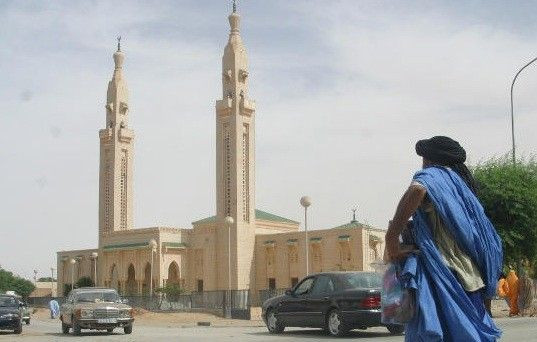Slavery In Mauritania: An Activist's Indictment Sheds Light On A Serious Humanitarian Issue
ANALYSIS

Biram Ould Obeidi, one of Mauritania's most vocal activists, was charged along with six others for participating in an April rally against slavery in the West African country.
During the April 28 demonstration, Obeidi set fire to a book he had taken from the Maliki School of Islamic Law, saying the text encouraged slavery. But this action angered Muslims, who were offended by the destruction of a religious book. Thousands took to the streets in protest.
The BBC reports that Obeidi later apologized, saying that his intention was certainly not to hurt the pride of Muslims.
Obeidi has been detained since early May, sparking still another protest -- this time, his own supporters were out to agitate for his release.
As a result, prosecutors have charged Obeidi and the six other activists with threatening state security. Their fate will now be determined in court.
Regardless of whether or not Obeidi is convicted, news of his indictment sheds light on the issue he was fighting against: the widespread existence of slavery in Mauritania. There, slaves and slave owners are largely separated by differences in skin tone; for centuries, lighter-skinned Arabs have historically been the masters of darker-skinned West Africans.
Mauritania has recently become a focal point for the international community due to its new status as an oil producer; it has also been considered an ally of the United States in the war on terror. But the slight increase of international attention in recent years has so far done little to eradicate the scourge of slavery in Mauritania.
This not a marginal issue. Hundreds of thousands of Mauritanians live in slavery today -- a shocking 10 to 20 percent of the country's total population of 3.4 million people.
Slavery was officially made a crime only as recently as 2007, but that doesn't seem to have made a dent in this pervasive problem -- CNN reports that only one slave-owner has been convicted so far under the new statute.
The Mauritanian government passed similarly toothless legislation to ban slavery in 1905, 1961 and 1981, but none of those decrees was ever enforced. Officially, the government denies the existence of slavery in Mauritania. Journalists who travel there to report on the magnitude of the problem must operate covertly, or else face expulsion.
The slaves themselves are often unable to fight for their freedom, as their captivity is not only physical, but mental. Many who are born into slavery grow up knowing no other way of life. Isolated by vast stretches of desert that surround the places where they live and work, these slaves often give their lives to their masters without ever encountering the concepts of equality, freedom and self-determination.
Furthermore, Mauritania is mired in poverty -- nearly half of the population lives on less than $2 a day. With so few opportunities to advance even outside the bonds of slavery, many see little incentive to seek freedom.
A combination of many factors -- racial hierarchies, geographical isolation, widespread poverty, psychological imprisonment and governmental apathy -- has deeply entrenched the practice of slavery in Mauritanian society.
But some groups are fighting for change. One of them, called SOS Slaves, was founded in 1995 by a former slave, Boubacar Messaoud, and a former slave owner, Abdel Nasser Ould Ethmane. In March, both men spoke to CNN about the cause that united them to fight for justice in Mauritania.
Abdel came from a slave-owning family that lived about 300 miles in from the coast. When he was sent to study in the capital city of Nouakchott as a 12-year-old, he encountered the writings of French Revolution-era philosophers who had long ago argued for humans' inialienable rights to freedom. It was a turning point, he said.
I started to ask myself if lies were coming out of this book, or if they were rather coming out of my very own culture.
When he met Boubacar on a rooftop during the 1990s, the escaped slave and former slave owner got to talking. Boubacar had also been forever changed by his education, and the two men decided to do whatever they could to overturn the system they had both been born into.
Today, SOS works on the grassroots level, one person at a time. They interview slaves so that they can spread their stories to an outside audience, and they also help free those who choose to escape.
It's not easy, said Boubacar.
The multi-generation slave, the slave descending from many generations, he is a slave even in his own head, he said to CNN. And he is totally submissive. He is ready to sacrifice himself, even, for his master. And, unfortunately, it's this type of slavery that we have today.
SOS Slaves is an illegal organization that has been condemned by the government, explained Abdel in an interview with iAbolish. They work clandestinely, and their efforts include emancipating slaves, establishing education centers and offering legal assistance.
Abdel and Boubacar know that increasing international awareness of slavery in Mauritania is vital to their cause.
To free the slaves, I realized, you had to convince the masters and the international community, which was supporting the ruling regime, said Abdel.
Boubacar agrees that convincing a diverse audience to take up the fight against slavery is of utmost importance. If we fail to convince a maximum number of whites and a maximum number of blacks, he said, then slavery will not go away.
© Copyright IBTimes 2024. All rights reserved.






















